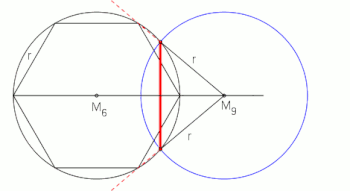Nonagon
| Regular enneagon (nonagon) | |
|---|---|
 A regular enneagon (nonagon) | |
| Type | Regular polygon |
| Edges and vertices | 9 |
| Schläfli symbol | {9} |
| Coxeter–Dynkin diagrams | |
| Symmetry group | Dihedral (D9), order 2×9 |
| Internal angle (degrees) | 140° |
| Properties | Convex, cyclic, equilateral, isogonal, isotoxal |
| Dual polygon | Self |
In geometry, a nonagon (/ˈnɒnəɡɒn/) or enneagon (/ˈɛniəɡɒn/) is a nine-sided polygon or 9-gon.
The name nonagon is a prefix hybrid formation, from Latin (nonus, "ninth" + gonon), used equivalently, attested already in the 16th century in French nonogone and in English from the 17th century. The name enneagon comes from Greek enneagonon (εννεα, "nine" + γωνον (from γωνία = "corner")), and is arguably more correct,[1] though less common than "nonagon".
Regular nonagon
A regular nonagon is represented by Schläfli symbol {9} and has internal angles of 140°. The area of a regular nonagon of side length a is given by
where the radius r of the inscribed circle of the regular nonagon is
and where R is the radius of its circumscribed circle:
Construction
Although a regular nonagon is not constructible with compass and straightedge (as 9 = 32, which is not a product of distinct Fermat primes), there are very old methods of construction that produce very close approximations.[2]
It can be also constructed using neusis, or by allowing the use of an angle trisector.


Symmetry

The regular enneagon has Dih9 symmetry, order 18. There are 2 subgroup dihedral symmetries: Dih3 and Dih1, and 3 cyclic group symmetries: Z9, Z3, and Z1.
These 6 symmetries can be seen in 6 distinct symmetries on the enneagon. John Conway labels these by a letter and group order.[4] Full symmetry of the regular form is r18 and no symmetry is labeled a1. The dihedral symmetries are divided depending on whether they pass through vertices (d for diagonal) or edges (p for perpendiculars), and i when reflection lines path through both edges and vertices. Cyclic symmetries in the middle column are labeled as g for their central gyration orders.
Each subgroup symmetry allows one or more degrees of freedom for irregular forms. Only the g9 subgroup has no degrees of freedom but can be seen as directed edges.
Tilings
The regular enneagon can tessellate the euclidean tiling with gaps. These gaps can be filled with regular hexagons and isosceles triangles. In the notation of symmetrohedron this tiling is called H(*;3;*;[2]) with H representing *632 hexagonal symmetry in the plane.
Graphs
The K9 complete graph is often drawn as a regular enneagon with all 36 edges connected. This graph also represents an orthographic projection of the 9 vertices and 36 edges of the 8-simplex.
 8-simplex (8D) |
Pop culture references
- They Might Be Giants have a song entitled "Nonagon" on their children's album Here Come the 123s. It refers to both an attendee at a party at which "everybody in the party is a many-sided polygon" and a dance they perform at this party.[5]
- Slipknot's logo is also a version of a nonagon, being a nine-pointed star made of three triangles, referring to the nine members.
- King Gizzard & the Lizard Wizard have an album titled 'Nonagon Infinity', the album art featuring a nonagonal complete graph. The album consists of nine songs and repeats cyclically.

Architecture
Temples of the Baháʼí Faith, called Baháʼí Houses of Worship, are required to be nonagonal.
The U.S. Steel Tower is an irregular nonagon.
Garsų Gaudyklė in Lithuania.
Palmanova in Italy.
See also
References
- ^ Weisstein, Eric W. "Nonagon". MathWorld.
- ^ J. L. Berggren, "Episodes in the Mathematics of Medieval Islam", p. 82 - 85 Springer-Verlag New York, Inc. 1st edition 1986, retrieved on 11 December 2015.
- ^ Ernst Bindel, Helmut von Kügelgen. "KLASSISCHE PROBLEME DES GRIECHISCHENALTERTUMS IM MATHEMATIKUNTERRICHT DER OBERSTUFE" (PDF). Erziehungskunst. Bund der Freien Waldorfschulen Deutschlands. pp. 234–237.Retrieved on 14 July 2019.
- ^ John H. Conway, Heidi Burgiel, Chaim Goodman-Strauss, (2008) The Symmetries of Things, ISBN 978-1-56881-220-5 (Chapter 20, Generalized Schaefli symbols, Types of symmetry of a polygon pp. 275-278)
- ^ TMBW.net
External links
- Properties of a Nonagon (with interactive animation)





